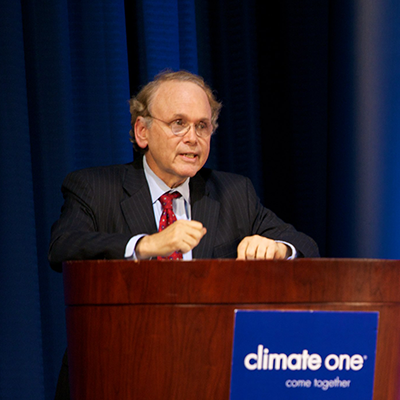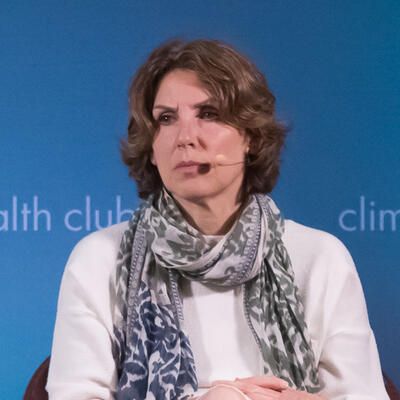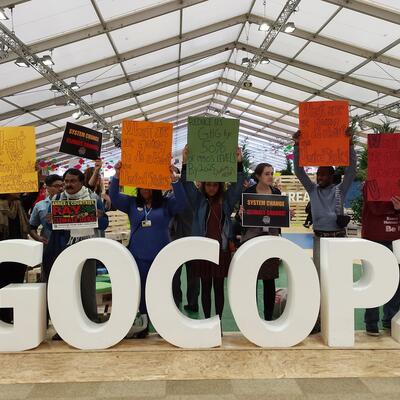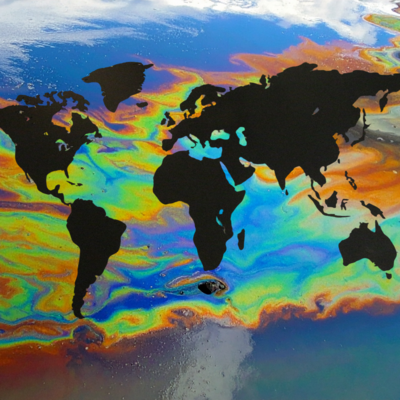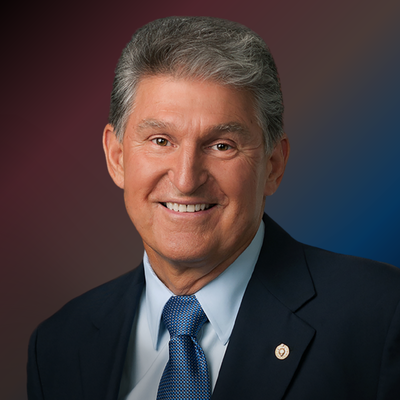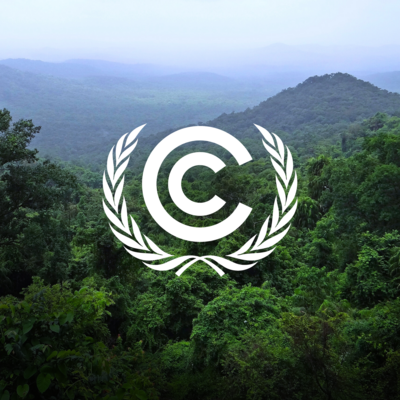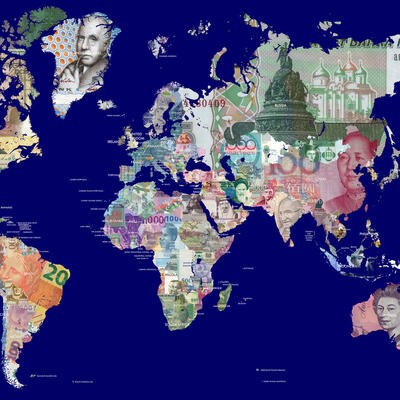
Daniel Yergin: Energy, Markets and the Clash of Nations
Guests
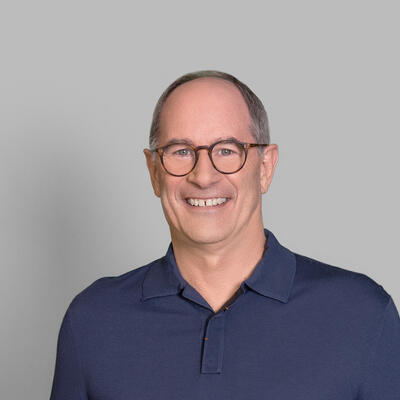
Roger Martin
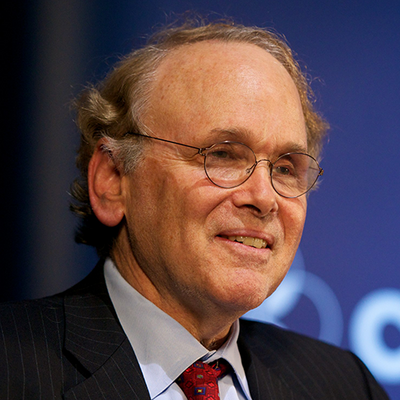
Daniel Yergin
Summary
The world economy is moving away from oil, and many world leaders think that transition needs to happen faster than the fossil fuel industry wants. But with extreme fires, droughts and floods hitting this country — not to mention a racial injustice awakening and global pandemic — can capitalism change itself in time?
“A lot of our systems are trapping us,” says business strategist Roger Martin. “The widely held publicly traded corporation is now trapped in a world where it has to start doing things that aren’t good for it.”
Martin is the author of When More is Not Better: Overcoming America’s Obsession with Economic Efficiency, in which he describes the perils of capitalism that puts shareholders ahead of everyone.
“If you say ‘our goal is to maximize shareholder value,’ all you're going to do is have your customers say, oh, so you don't care about us, your employees say, oh, so you don't care about us, your communities say you don't care about us, and make your job much harder,” he argues.
So how are the economics and geopolitics of energy changing, especially with the arrival of the covid pandemic?
“There is no precedent for what's happened because we’ve never had a mandated government shutdown of economies,” notes Pulitzer Prize-winning author Daniel Yergin. “This isn't about supply and demand, this is about the economies being open or closed.”
In his latest book, The New Map: Energy, Climate, and the Clash of Nations, Yergin explores the relationship of energy and geopolitics and how they come together, especially with respect to the rise of China.
“I think the single biggest geopolitical issue in the world today is a relationship between the U.S. and China,” he says, “It's getting worse and it's getting more polarized.”
Like many energy experts, Yergin thinks that energy efficiency is key to addressing climate change, and believes the U.S. is uniquely positioned to develop the necessary technologies.
“I think one of the great advantages the United States has over every other country is our innovative ecosystem that stretches from our 17 national laboratories to universities and think tanks to startups to established companies,” he says, “and I think that's a great strength actually in addressing issues of climate.”
Related links:
The New Map: Energy, Climate, and the Clash of Nations
The Prize: The Epic Quest for Oil, Money & Power
Recovery Plan For Europe
When More is Not Better: Overcoming America’s Obsession with Economic Efficiency
Sustainalytics
This program was recorded on August 24 and September 14, 2020.
Full Transcript
Greg Dalton: This is Climate One. I’m Greg Dalton. [pause] The world economy is moving away from oil.
Dan Yergin: What's gonna happen to oil demand, when does it peak out? This energy transition that has become such a central concept unfolds over decades, it doesn't unfold overnight.
Greg Dalton: Many leaders think that transition needs to happen faster than the fossil fuel industry wants. But with extreme fires, droughts and floods hitting the country — not to mention a racial injustice awakening and global pandemic — can capitalism change itself in time?
Roger Martin: A lot of our systems are trapping us. The widely held publicly traded corporation is now trapped in a world where it has to start doing things that aren’t good for it.
Greg Dalton: Energy, Markets, and the Clash of Nations. Up next on Climate One.
---
Greg Dalton: How much do corporations need to change to stay in business in a hot and disrupted world? Climate One conversations feature energy companies and environmentalists, Republicans and Democrats, the exciting and the scary aspects of the climate challenge. I’m Greg Dalton.
Roger Martin: If you say “our goal is to maximize shareholder value,” all you're going to do is have your customers say, oh, so you don't care about us. Your employees say, Oh, so you don't care about us. Your communities, your environment also, you don't care about us, and make your job much harder.
Greg Dalton: That’s Roger Martin, a business strategist and author of When More Is Not Better: Overcoming America's Obsession with Economic Efficiency. He’ll join us later on today’s show. First: How are the economics and geopolitics of energy changing amid the covid pandemic?
Dan Yergin: This isn't about supply and demand, this is about the economies being open or closed.
Greg Dalton: Daniel Yergin is a Pulitzer Prize-winning author of many best-selling books, including his seminal one on energy, The Prize: The Epic Quest for Oil, Money & Power. His latest is The New Map: Energy, Climate, and the Clash of Nations. Yergin is Vice Chairman of IHS Markit, an energy consultancy and serves as CNBC's Global Energy Expert. Our conversation begins in the fall of 2019. A trade war between the United States and China is battering the global economy, and hurting demand for oil, with prices down to about $60 a barrel. Then, on September 14th...
SkyNews clip: A twin attack at night with drones on two major Saudi oil facilities, one of them the largest in the world. This was an extraordinary operation -- the scale, the method, and the impact.
Daniel Yergin: This was the biggest disruption that ever happened in world oil. It was an attack on the Saudi facility for processing oil that is exported. It came from the North probably directly or indirectly, from Iran and it was a shock but what was also surprising was that the recovery from it was pretty quick much quicker than would've been expected.
Greg Dalton: And then a few months later in December, COVID-19 was identified in Wuhan, China. That also led to a dramatic shock to the global oil industry. Now the industry is used to boom and bust, how is the COVID crash different from other oil bust?
Daniel Yergin: Well this is a shock that continues to persist us and will persist until there is a vaccine. But it really came in a couple of different phases. The first phase was China and it shut down the Chinese economy for a number of weeks. And people said this is the biggest shutdown in world oil that's ever happened because suddenly 8 million barrels a day of demand disappear out of a world of about 100 million barrels a day. But it was still thought, you know, I think people still have the model in their mind of the SARS epidemic of almost 2 decades ago and thought it was kind of constrained to China. And then we had the second phase, which was when it really hit North America and hit Europe, and you have what I call the new map an economic dark age. And then you had a much larger collapse in demand which reflected the collapse in the global economy in general, losing more than a quarter of world demand. And then we’re now in kind of phase 3, which is this very uneven economic recovery with the virus with shutdowns flaring up and down. And that’s reflected in oil demand and almost oil demands has become almost a register of what's happening to the global economy and what COVID-19 is doing to the global economy.
Greg Dalton: Right. And we had a day in there with negative prices and there is the Russia OPEC price war over production cuts. It seemed to me the markets were slow to grasp how different this time is.
Daniel Yergin: Yeah. You know, people say, Greg, well what’s the precedent? There is no precedent for what's happened because we’ve never had a mandated government shutdown really of economies. And this is part of it that this is just so much greater than anything that this isn't about supply and demand this is about the economies been open or closed
Greg Dalton: And will this perhaps lead to some structural shifts that we’ve seen some oil companies BP and others sort of writing down some future assets saying they’re not quite sure some of this investments might be written off their books, or there might be some permanent changes happening, structural changes here.
Daniel Yergin: Well, Greg, there are two parts to that question. One is kind of write down is where people say assets that were valued they’re now valuing them. But that's because what type of price estimate do you use and that constantly shifts and so assets they get written down get written up again. But you're raising a larger question which is how has COVID-19 changed how we live, and I think the power of digitalization people say what was gonna take five or six years has happened in a few months. Everybody, you know, people found that they’re working at home commuting is down and we can measure that in terms again of gasoline demand. And so the questions are on the one hand, are people -- is there gonna be much is the nature of work changed by what's happened? And does that mean that the morning commute and the evening commute is gonna be much less than it was or on the other side are people gonna be reluctant to go on public transportation and use cars more. And when you look at China what we see China's now more or less back and we see oil demand up people driving more because they don't want to go in public transportation. So I think it's still very open questions but you know something like this you know we know in some ways we're just not going to go back to the world that we knew in 2019.
Greg Dalton: You write, a lot of what you write about is about how hydraulic fracturing developed in the United States with government assistance has changed the power dynamics of global energy. And you write that the United States will continue to have an abundance of natural gas, but the hectic growth days of shale appeared to be over. We’re seeing fracking companies going bankrupt weak balance sheets. Is the party over for the natural gas boom?
Daniel Yergin: Well, I think shale you have to think about in terms of both oil and gas. Because remember the U.S. a decade ago was importing 60% of its oil it was the largest importer of oil in the world. Now, even with COVID we’re the largest producer of oil ahead of Saudi Arabia and Russia big change. But I think that kind of, there have never been a growth like you saw in shale gas shale oil and it carry the U.S. into a different position. I think that as you say that industry, like others has been hard hit. I think that the U.S. will remain in a preeminent position but it's not those days of the rapid growth, which was the most dynamic element in the world market are over. It was interesting if you went back a decade. The most dynamic element in the world market was the growth of China economic growth and its demand. And you know that from your own experience out in Asia. And that's what dominated the market it took oil over $130 a barrel. Now with shale which the dynamic element which really wasn't anticipated to change the balance in the marketplace and change global politics.
Greg Dalton: And then you write that offsetting the slack in oil demand use of plastics is increasing in a lot of areas where during COVID we’re trading hygiene for environmental sustainability. And some people think that the oil industry will transition to plastics as less oil is burned because of climate change. There’s a lot of infrastructure being built in Asia and elsewhere. So how is, you know, are plastics gonna save the oil industry products?
Daniel Yergin: I mean I think it’ll be important you know, I think that as you say COVID has really brought home the role of plastics. If you going to a hospital operating room so much of what’s there is plastics. Now you go into a store, a drugstore and there's a plastic shield between you and the person behind the cash register. So, you know that hygiene factor and single-use plastics you don't want to have non-single use plastics used in hospital rooms. So I think that's the growth area the growth factor, you know the big debate as you know what's gonna happen to oil demand. When does it peak out and some think it peaks out the next few years. I think based upon the numbers of cars economic growth and so forth. Assuming we return to some good economic growth globally and rising incomes in places like India. I think probably oil demand peaks out later in the kind of early part of the 2030s. But I think it's kind of part of a larger position that this energy transition that has become particular after the Paris conference, such a central concept unfolds over decades it doesn't unfold overnight.
Greg Dalton: You note alarm about climate disruption driven by fires torrential rain falls heat waves ice melting. As you and I are talking California is suffering wildfires are ravaging California. Recently there was 130° day in Death Valley, the third hottest day ever recorded on our planet. How concerned are you about climate change?
Daniel Yergin: Well, I think climate change obviously is a big issue and, you know, in the previous book, The Quest I had over 100 pages explaining how climate change went from an issue that a few scientists in the 19th century worried about because they were concerned about another Ice Age to the kind of political force that after The Quest came to bear in the Paris agreement of 2015. And I really divide the energy era there’s before Paris and after Paris. We’re in after Paris when you have nations, to one degree or another, signed on to restraining emissions bringing down emissions to help manage climate change. I think we also need to think about building greater resilience. I just did an event with the mayor of Houston, they had Hurricane Harvey you have to build resilience in. And then I think the third element is we did this big study called breakthrough energy and Bill Gates and bunch of other funders on what are the technologies you need for the future that you know that there’s a science side of this that's very important as well.
Greg Dalton: Right. Energy transitions have happened many times would to call the early 1700s, and others to nuclear, etc. to oil now to renewables. The question now is the pace. And industry certainly people who are invested in fossil fuels will like that go as slower, more comfortable pace. And people who are activists and scientists say we need to go faster. Larry Fink, CEO of BlackRock largest asset manager in the world is now pressuring companies. Exxon shareholders voted to require the company to disclose its climate risk early this year. 49.6% of shareholders at J.P. Morgan Chase supported a resolution calling for it to align. So talk about the pressure on banks and energy companies to go faster.
Daniel Yergin: Well, I think the first question is, how do you manage emissions how do you bring them down? We have 280 million cars in the United States, 279 million of them are powered with gasoline. Cars are, you know, 7% of global emissions. What do you do about all those cars not including light trucks it’s higher with light trucks. We have embedded technology how do we bring technology to bear. And I think that what you pointed to is that a very important part of the picture post Paris post 2015 is the role of financial institutions what's called ESG. Environmental, social and governance. That has really come to the fore and investors are asking and telling companies, you know how do you align yourself with the Paris objectives. And I think this has become pretty pervasive it's stronger in Europe where the E.U. has a whole thing called the taxonomy. Which I write about in the new map where in terms of allocation of capital in terms of regulation trying to accelerate energy transition in Europe.
Greg Dalton: And there's been some controversial projects in the United States Keystone XL, Atlantic Pipeline. Some might say Shell’s $6 billion foray into the Arctic and then they retreat. You write about Greta Thunberg and others in Standing Rock. Is that social pressure sort of the social license to operate is being questioned in some circles of oil companies’ divestment from universities, you’re all on water, Yale and Harvard others. How much of an impact is that having?
Daniel Yergin: Well, I think that we do have these very abundant resources in the United States. And I think, big battle has become over building pipelines where energy and environmental considerations collide and end up usually colliding in the courtroom. And whether those resources flow to markets or not and there's, you know, concerted effort is you know very well to prevent new pipelines from being built. But, you know, will the resources get to markets and, you know, as you know that a major part of the reduction the fact that the United States emissions are down to the level of early 1990s at a time when the economy this is before COVID had doubled, was because of natural gas replacing coal in electric generation. And that was considered a positive a lot of people don't consider that a positive anymore. But, you know, from factual basis that's what's been the major contributor to bringing down our emissions.
---
Greg Dalton: You’re listening to a Climate One conversation with energy guru Daniel Yergin, author of The New Map: Energy, Climate, and the Clash of Nations. Coming up, putting new energy technologies to work.
Dan Yergin: I think one of the great advantages the United States has over every other country is our innovative ecosystem that stretches from our 17 national laboratories to universities and think tanks to startups to established companies. And I think that's a great strength actually in addressing issues of climate.
Greg Dalton: That’s up next, when Climate One continues.
---
Greg Dalton: This is Climate One. I’m Greg Dalton. We’re talking with Pulitzer Prize-winning author Daniel Yergin. His new book is The New Map: Energy, Climate, and the Clash of Nations. With U.S.-China relations at their worst point since the days of Mao, Yergin talks about the dangerous tensions between the two powers.
Daniel Yergin: I think the single biggest geopolitical issue in the world today is a relationship between the U.S. and China. And Greg it's getting worse and it's getting more polarized. Each of the militaries is kind of focusing on fighting the other. And, you know, I focus a lot on the South China Sea on Belt and Road and you know, and of course the technology race. So I think this is, you know, there are about 370,000 Chinese students in American universities spending about $13 billion a year. And I thought in general, this is good thing they go back we’re connected some stay in the United States and become great entrepreneurs. Now it's become a very fraught area. So I think every element of this relationship --
Greg Dalton: Some of them are spies trying to steal American intellectual property?
Daniel Yergin: Well, exactly and that's it. And so we don't know what percentage of it. Most of them are not but some are. I mean I didn't want to go there but the more you think about history you see elements that remind you of the Anglo German tension and antagonism before the First World War it involved a naval race, that's what we, we actually have a naval race going on. And of course it involves technology, Huawei. And, you know, I was thinking you worked in China for a number of years as a journalist, very different set of relationships and dialogue it was much more positive. I mean you must have the same reaction of concern to see this spiraling downward.
Greg Dalton: A lot of it comes to questioning intentions and motivations. China been down for 100 years and coming back to what they see as their rightful place in the world of historically they’ve had. But they feel encircled by the United States so it gets if that trust question someone's motivations and you look through that dark interpretation and then add in the pipeline with Russia and the alignment between China and Russia now as, you know, the Cold War that strategic triangle was very complex and shifting. So bringing Russia here, which is a big petro state, you know John McCain famously said that Russia's a mob run gas station. Bring Russia into it.
Daniel Yergin: Well, I think that one of the really important things to note if you talk and you know what I'm trying to write about in the new map is the relationship of energy and geopolitics and how they come together. And they really do in the Russian - Chinese relationship. And Russia has gotten closer and closer to China. I describe two scenes in the new map. One, I was in a conference about year and a half ago and Xi Jinping, the President of China and Vladimir Putin, President of Russia are there. And Putin apologizes to Xi Jinping, I kept you up late talking it was 4 o’clock in the morning. And Xi Jinping says to him we never have enough time to talk about. And then I go forward a few months and Putin and Xi Jinping are meeting in Central Asia and Putin brings the Russian ice cream that he says that Xi Jinping really loves, his favorite Russian ice cream and Xi Jinping says, you’re my best friend. So I think this relationship between Russia again, you’re suggesting Greg there are a lot of factors have come together. But that's a big geopolitical factor the alignment of those two countries and they’re joined together by oil and gas. Russia is a big supplier seen as a secure supplier to China. And they are also brought together by their emphasis on absolute sovereignty and their common opposition to the United States. And I guess they’re brought together by the fact that Xi Jinping is president of China for life and Vladimir Putin is president of Russia by the new constitutional amendment to 2036, which is kind of like being president for life.
Greg Dalton: And you write how Yeltsin and Gorbachev were unlucky when it came to the price of oil which keeps the Russian or Soviet economy afloat. How is Vladimir Putin faring in terms of this now questioning oil they're very dependent on fossil fuels for their economy because they don’t seem to do a whole lot else that the world want.
Daniel Yergin: You know, when he became president of Russia almost nobody had heard of him I mean he was sort of a mid-level former KGB guy who then had spent a decade rising up in the post-Soviet system. But he was very lucky because those two you mentioned, Yeltsin Gorbachev, price collapsed both times and it undermine them. And Putin rose up the ladder of rising oil prices that this sort of supercycle as it was called and commodity. Oil going from $20 a barrel to over $130 a barrel and that solved a lot of problems for him how to pay pensions how to pay for his army and everything. So he was a great beneficiary of that. What then happened is that, you know, there's been a couple price collapses right now and they have adjusted their economy to the degree that they probably get by with about $50 a barrel oil. Doesn't give them a lot of elbowroom, but they don't want prices too high. And something else to keep in mind about Putin, he looks at shale not just as an energy source not just as a competitor. He looks at it as an adjunct of U.S. foreign policy. He sees shale having given the U.S. of flexibility globally that it didn't have before because it’s no longer so highly dependent upon imports. And indeed he sees the U.S. deliberately trying to compete with Russian gas in Europe with LNG. So that’s kind of the picture I think that he has. But he still has a problem of an economy that's way overly dependent upon oil and gas and just hasn't been able to reform.
Greg Dalton: And that makes Russia threatened by Paris climate accord. If the goals of Paris are to the decarbonization of the global economy that's not in Russia's interest. And we know that Russia is meddling in the United States. So what is that mean for Russia trying to slow down and sabotage the Paris process?
Daniel Yergin: Well they’ve signed on to Paris. I mean it’s one thing to sign on to something and it's another thing to do something. So I don't think they're particularly hastening to do anything about climate, you know, to the same degree. I think their focus is more near-term. I think it is on the competition with the United States competition in the world market and the geopolitical influence that they draw from their position that they’re meddling they know how to meddle, that’s, you know, they certainly did in 2016 and all signs are they going to continue to do it in this electoral campaign and they prove very adept at it. And it’s not only our elections by the way, it’s other elections too. So there's this whole new battlefield that didn't exist before which is the, you know, the Internet, the digital the public opinion battlefield around digital communication that as part of this new Cold War. With the Soviet Union it was about nuclear weapons now it's about a lot of other things including energy and including technology and Internet.
Greg Dalton: If you’re just joining us, my guest is energy guru and Pultizer Prize-winning author Daniel Yergin. His latest book is The New Map: Energy, Climate, and the Clash of Nations. You write about the Europe’s Green Deal the plan to kind of build back greener out of the COVID receptions. And you note that for Europe to achieve its goal per capita emissions would have to decline to the level of India where per capita income is about $2000 a year compared to Europe's $38,000. Well, factually correct, are you suggesting that decarbonization requires a reduction in material living standards?
Daniel Yergin: I think decarbonization requires new technologies to get there. I don’t think you’re gonna do it with existing technologies. And that goes back, you know, because I have a chapter that draws upon the work I did with Ernie Moniz, a former energy secretary on energy technologies. I think we need heavy investment in technologies. And technologies take five or 10 years, you know, they don't just sort of appear. And so something I've felt strongly is that we need a basic commitment to R&D that doesn't go up and down with budgets because we need that to really address these questions. Is air capture of carbon gonna work? Is there going to be liquid fuels from, you know, plants artificial photosynthesis. Lot of things that people working on and I think one of the great advantages United States has over every other country is our innovative ecosystem that stretches from our 17 national laboratories to universities and think tanks to startups to established companies. And I think that's a great strength actually in addressing issues of climate
Greg Dalton: There’s another theory of change, which is we don't needed a new technology we just need to deploy what we already have. We have electric cars they're not affordable for everyone. But some support for that could move forward. We have all the technology we need we just don't have the political will and deployment to get them in everybody's hands.
Daniel Yergin: Yeah, I guess I disagree with you. I think that we need a new generation of batteries we need cheaper batteries. And by the way when the battery system that's not, you know, China dominates the whole lithium battery supply chain. I mean there’s a whole geopolitical element here that's not recognized in terms of they dominate solar manufacturing. So I think you know, so I think --
Greg Dalton: Part of that because we’ve let them run away with that, right?
Daniel Yergin: Well, I think that’s something I spent some time actually that very question, why did it happen. The Chinese have been, we let them but they also made this investment in this massive manufacturing capacity which they may you know, we don't really know what the subsidy situation is we don't really know whether they're making money or not, but they have undercut everybody else. When I started writing The Quest I interviewed the head of the largest German solar company. By the time I was finishing the book he gone bankrupt because of Chinese manufacturing. So I think do we need a national energy policy? So I think we have batteries we have electric cars we have about a million on the road. We have 279 million that are not electric cars. The average car stays on the road now for almost 12 years. So it's just that's you know, kind of it's the reality of these numbers. You can say you can regulate it you can use pricing like a carbon tax or carbon price and you can use innovation. And I think our great strength as a country is our innovative capacity.
Greg Dalton: There’s a question though even some of the Silicon Valley venture capitalists that I speak to question whether markets will do it in time because of the incentives and the structure. Markets may get us there, but not fast enough. There needs to be some policy supporting and then --
Daniel Yergin: I mean it’s questions what is the it? Are you gonna remove all 279 cars off the road? Here's another question for you. Germany shut down all of its nuclear power plant, it will have shut down by 2022 or 2023. In the same period that they’re being shut down, China has more than increased its share of nuclear. So, you know, the nuclear industry now globally has kind of been more dominated by the Chinese and the Russians.
Greg Dalton: And that's where the economics are opaque. We don't know how much state subsidies happening there if they're standing on their own economically they're not, Russia and China not market economies, right.
Daniel Yergin: Exactly. And that goes to the whole trade dispute so much as opaque about what's the government role in terms of supporting everything and including that it extends to solar too we don’t know that.
Greg Dalton: And there’s solar in some places in the Middle East and elsewhere that is, you know, approaching two cents a kilowatt hour. Solar is the cheapest energy on the planet right now. So talk about the --
Daniel Yergin: Well, I mean it depends on the financing of it and how you finance. But there’s no question that I talk in the book about the shale revolution. I also talked about the solar revolution. I mean this decrease 85% decrease in solar costs or a little more than a decade. I mean I think that's as biggest surprise as what's happened with shale. And it does mean that you know if you're in the Middle East you have a lot of son and you need a lot of air-conditioning solar is a very good option. And so look at Abu Dhabi, Middle East country building big solar they’ve also building four nuclear power plants and they're using gas. But I think, you know, solar is the advance of solar is quite remarkable as we look in California a decade ago, you know, you could almost not measure really the contribution of solar in terms of generation. In 2019 it was 14% of generation.
Greg Dalton: Which is why some people say the path forward should be to electrify everything. Electrify mobility, get combustion out of homes that’s starting to happen in California in other places. No new natural gas lines methane lines into new construction change up your gas stove for a convection oven. Given that solar is so cheap what do you think about electrifying --
Daniel Yergin: Well, I think that we also find that solar needs a partner and that partner happens to be natural gas because of the variability that, you know, California has its problems. There are a number of reasons for it but part of it is and, I know that other parts in the U.S. are looking at the California experience wanting to learn from it specific issue about how do you manage the variability. And that gets a bit again back to the technology that the control mechanism the storage mechanisms that you need if you are going to move towards a much more renewably-based economy, you need storage that doesn't last just for an hour or two, you need storage that can last for several days. And that's when we’re talking about the energy transition that's it and we go back to research we need it's the next generation the next, next generation of batteries that are needed.
Greg Dalton: One big country that we haven't talked about is Saudi Arabia. There’s been a lot happening there floating shares in the state run oil companies. Saudi Aramco seen as perhaps a hedge against fossil fuels. MBS, the crown prince there very controversial figure involved in the killing of Jamal Khashoggi the Washington Post reporter. So talk about Saudi Arabia's transition are they serious about hedging their risk on fossil fuels or is that just optics?
Daniel Yergin: Well, I think on the one hand, I think Saudi Arabia sees itself, you know, if there is the day of peak oil and declining that they'll be the last person standing because they're a very low-cost producer and they have a lot of oil very large reserves. But I think, you know, whenever the oil prices collapsed the oil exporting countries what we talk about what we need to diversify our economies but they never have. I think this time they really do, you know, they see that the world is gonna change. Oil is not going to, you know, it’s now about 32% of world energy its share will decline eventually over time. And so and they look next-door at Abu Dhabi which is a smaller country but one which has gone from country that was almost all of its GDP was oil now it’s 60% non-oil and they’re saying among other things, we have to build up a sovereign wealth fund so that we can invest it, diversify it around the world. They went to a period of heavy investments in Silicon Valley and they have this vision 2030. But, you know what it's really hard to diversify an economy it’s a cultural thing it’s an educational thing. You need to, you know, people need predictability you need small business needs to be able to start up and so forth. So I think you know a lot of discussion about diversification but I think particularly in this context when oil prices have come down combined with COVID it's a lot more difficult. But I think they are looking at it more than let's say Russia is, I would say. But I think a lot of countries, Nigeria, you know, other countries in Africa other countries are you know, kind of facing the same question. You got to diversify your economy.
Greg Dalton: Well, Dan Yergin thanks for coming on Climate One.
Daniel Yergin: Thank you, Greg. This was a great discussion, I appreciate it.
---
Greg Dalton: Daniel Yergin, Pulitzer Prize-winning author of The New Map: Energy, Climate, and the Clash of Nations. While he says the energy transition will happen slowly, sometimes change happens faster than people expect.
Roger Martin: If you would have gone back to, when an Exxon was the most valuable and done the who'd a thunk it, I mean, you would have gotten people saying you're an idiot. Being punted out of the Dow Jones 30, is insane. You're insane.
Greg Dalton: That’s up next, when Climate One continues.
Greg Dalton: This is Climate One. I’m Greg Dalton. Daniel Yergin and many other experts say that energy efficiency is a key to addressing climate change: more efficient cars, appliances, and factories will allow us to maintain our economy and stabilize the climate that supports it. Business strategist Roger Martin agrees—mostly. Martin is author of the new book, When More Is Not Better: Overcoming America's Obsession with Economic Efficiency.
---
Roger Martin: I'm a fan of efficiency. But I'm not a fan of efficiency when it doesn't take into account resilience. And some things what you're just referring to felt like efficiency that drives resilience that good kind of efficiency. Efficiency that ignores resilience is a bad kind of efficiency. So, for example we just want to use something topical. It was extremely efficient to carry minimum stocks of PPE in the hospitals of America, right. Because you want to monitor your warehouses and storerooms full of PPEs that you weren’t gonna use on a regular basis. That makes for more efficient use of working capital and more efficient use of storage space. But it's isn’t resilient at all at all and so that's where you have to have it just a sense of balance between efficiency and resilience.
Greg Dalton: Right. And American capitalism is you're right, has an obsession with efficiency. We live also in a culture and economic system in which more is always better. Publicly trading companies are expected to pose revenue growth quarter over quarter over quarter. When people stop buying stuff the economy sags people lose their jobs donations to nonprofits go down. Where does this lead are we trapped?
Roger Martin: A lot of our systems are trapping us, yes. And so, I think the widely held publicly traded corporation is now to a great extent trapped in a world in which it has to start doing things that aren’t good for it. That means growing faster than it makes sense to grow and everything has a lifecycle. And there are many corporations out there that have had explosive growth gotten big and would be better off for their employees better off for their shareholders actually to destabilize and not grow because other things are growing and not them. But that then makes them a complete capital markets failure complete bust and people will come in and chuckle costs and whatever to try make their revenue grow. But it’s one of these things that’s unsustainable I mean the whole environmental movement that you're so involved in is one form of sustainability. But I think of sustainability writ large right which is you should make your corporation sustainable in the sense that if you have a corporation that makes money by being horrible to its employees, right, or being shady with its customers. That's as unsustainable as having factories spew pollution and destroy the earth. Those are different forms of the absence of sustainability.
Greg Dalton: And recently we’ve seen billionaires question the American form of capitalism. Ray Dalio has said that the American dream is lost and that “capitalism needs to be reformed.” Salesforce founder Marc Benioff has called for a new capitalism that includes higher taxes. You write about the perils of democratic capitalism as its practice in the United States. How healthy is it?
Roger Martin: Well, I think it's getting less healthy, right. So, I think this obsession with efficiency on alloy just more is better in the treatment of the American economy as a perfectible machine which we can just keep pushing harder and making more perfect. That's what's undermined what I think is the beauty of American democratic capitalism. I mean, I know it’s not maybe the most popular thing to say now, but I think it's a beautiful system and has done wonderful things for America and in the world. But it shifted, you know, after 200 years of working, kind of one way and kind of working better I think and better, it’s shifted. And so, I do agree with these billionaires who are I think thoughtful people. I think Marc is a thoughtful person and I think Ray Dalio is too. Although I don't agree with his views as I say in the book on the economy as machine. But if we don't think about it, and we don't take care of something that is as precious it will cease to be a great form of political, social organization. And the problem is there isn't a great list of other I can’t think of examples of systems to use that have worked great elsewhere.
Greg Dalton: But that might be a false binary. This idea that it's capitalism or socialism. There are many different flavors of capitalism in Europe for example, where there are markets, but the government has a firmer role. And I think in this country we have this like socialism anything that where the government has kind of some strong input on setting the rules. Would you agree with that we have this false binary of capitalism or socialism? There's a lot sort of in that middle.
Roger Martin: I guess so. Like I probably see it a little bit different which is I love Scandinavia and like I love a whole bunch of things about the way these countries work now. Granted these are small countries and small countries are easier to manage and run than a big gigantic one. So, there are sort of these nice bite-size economy as I work a lot in Denmark as it turns out and I love it. I do not think of any Scandinavian country as what I would think of a socialist, I just don’t. I think those are cleverly capitalist countries. For example, people think of Sweden as a high tax regime, right. It’s got these high taxes because it’s got a socialist. Most people do not realize that its corporate taxation regime is much more favorable than the U.S. is.
Greg Dalton: Who knew?
Roger Martin: Yeah. And so, Sweden is super clever. What Sweden says is, you know, we’re gonna make this one hell of a country to live in. And for that privilege you are going to pay very high taxes. Personally, if you are a high-income person but that's okay because it’s a hell of a country to live in and we’re gonna make it that with all sorts of things that yes people may be on the American right would call socialist. I don't consider good healthcare socialist and the like. But they say the corporations, you know what your job is, is to create great jobs where people will make a lot of money and then we will tax them to fund this wonderful system we have. We are not interested in taxing you at a high rate so you're less likely to create great jobs in this country. Maybe take your money outside and create those jobs elsewhere. We want you to create great jobs here and so we’re gonna tax you at a very low rate like very low rate. Now that you call that socialist? I'm not saying it. If somebody calls that socialist, I say I call that clever, clever capitalism. Figure out how to run a great country and tax the right people for the right things.
Greg Dalton: Sure, sure. And you write that markets are complex systems they’re smart they adapt. And yet Mark Carney, the former head of the Bank of England has said investors face huge financial losses because markets are underpricing climate risk. Markets which we worship in this country are not fully reading or incorporating the information about climate risk. Do you agree?
Roger Martin: Yes. Now, I am relatively encouraged on that front though because I've been kind of watching this for a while and I was on the school foundation board for a while and that was one of the issues that we worked on. And there’s just so much better information out there now. Like I'm a practical guy and my view on tools is that when a human being, doesn't have a tool to do a thing that he or she might want to what might otherwise want to do they just don't do it, right. So, we only do things we have tools for. And there were no responsible investing funds, right, for example, until there was a tool for judging whether a company is responsible or not. Sustainalytics and these ranking systems came out so that people could say, oh you’re ranked above the bar we’ve set so we’ll invest in you and you’re ranked below the bar we want to invest in you. Once you have tools people will use them. If you don't have tools, they will throw their hands up and say I wish this weren’t the way it was. But I don't know what to do, but I don't know how to put one foot in front of the next on it. I think boards now do pension funds now do and we’re gonna see I think a sea change in how the markets treat climate risk and are already in my view.
Greg Dalton: If you’re just joining us my guest is Roger Martin business strategist and author of When More is Not Better: Overcoming America's Obsession with Economic Efficiency. Ten years ago, you wrote about the perils of capitalism that put shareholders a hunter 10 years ago you wrote about the perils of capitalism that put shareholders ahead of everyone and everything else. Now the notion of stakeholder capitalism is becoming more mainstream that's a form of capitalism that serves broader interest in recognition of income inequality, systemic racism, and the climate crisis. How will that ever be realized when corporate executives who are paid in stock hold so much power over the politicians who write the rules?
Roger Martin: It's a tricky and a big problem. Yeah. I've been writing about this for a long time. So it’s like Aristotle, Aristotle is one of my favorite writer probably, you know, and he said way back when if a man because he only wrote about men in those days. For a man seeks to be happy is unlikely to end up happy. If a man seeks to lead a good life by which he meant a life of servitude his fellow man, he’s likely to end up happy. Well, this is the same with corporations. If you say, our goal is to maximize shareholder value what you’re gonna do is have your customer say, oh, so you don't care about us. Your employees say, oh so you don't care about us, your communities, oh so you don’t care about us and make your job much harder, right. If instead you genuinely say, you know, I’m about making the world a better place, you know, I also need to make money for the people who give me the resources to invest but I'm into making the world a better place. I think it makes your customers happy. It makes your employees happy it makes the communities happy it makes your job easier. I would say between 10 years ago and now there's a little greater recognition of that. But I do think that the greatest change on this front is not going to come directly from the corporations but indirectly. So, when customers say we want something different, corporations will move. When investors say we don't like what you're doing corporation we’re not gonna give you money and it starts to change. And when employees say I'm gonna choose who I work for on the basis of how good I feel about what they're doing for the world. I think it's all those things that are going to have the biggest impact on corporations. So, there's only so much I want to do of saying to corporate CEOs, you must be different. I mean how happily I say that and I write lots about that. But I'm much more interested in customers saying, sorry I ain’t buying your stuff unless you do this sort of things, or even better I’m gonna buy, as I talked about in the book, I’m gonna buy somebody else's stuff. I’m gonna reward these people for what they're doing. We need much more of that to have the kind of widespread change that I think you and I and others all would like to see.
Greg Dalton: Well, we talked earlier in this episode with Daniel Yergin who sees a decades long transition from fossil fuels to cleaner types of fuels. The challenges that climate scientists say we don't have a lot of time, and consumers don't have a lot of choice. Because basically for a hundred years, gasoline has been a monopoly. Yeah, you can buy an electric car if you can afford one. So how do you see the energy transition happening? Will markets alone do it or do markets need encouragement from government?
Roger Martin: I’m totally into sensible encouragement from government. And, you know, I think even though the car companies, you know, said life as we know it will and when CAFE, you know, the corporate average fuel economy regulation came in 40 years ago. I liked that I've always liked it as a form of regulation because they said to the car companies, you must use aluminum, you must make your engine smaller. You must do these things which are inputs to the output that you want. They said, you guys are better at this. Corporate average fuel economy now is 13 1/2 miles per gallon and in 10 years it’s gonna be 27.5 or we’re gonna fine the hell out of you – go. So I think like I kind of like the idea of using CAFE which has been used, right, to keep amping up the fuel efficiency required in a way that makes it more attractive which it already does but maybe even more attractive to have a bigger portion of electric vehicles in the fleet that you sell every year. So, I agree that having been said, right, you know, I think Tesla's done a wonderful thing for the world. Because who is sort of backing Tesla, right, consumers who are lined up to get on wait lists for the new vehicle. So, you have this consumer pull that says if you build one of those things that’s gonna be better for the environment I'll buy it. It’s better than saying the government saying you gotta do something that produces something that people don't like, right. Because that’s what some regulation unfortunately does. And it’s just less powerful regulation and regulation that’s in tune with what consumers want. So, you’ve got consumers desperately desiring a Tesla and the government rewarding Tesla for producing that thing. That's the best of all worlds.
Greg Dalton: And Tesla's now valued by the stock market much more than any other automaker. And on the other side, Exxon Mobil was recently kicked out of the Dow Jones Index after 100 years. Just 10 years ago, Exxon Mobil was the most valuable company in the world. Now it's been surpassed by tech. So how do you see that divergence the valuation of what the market saying about fossil fuel companies and their future?
Roger Martin: I mean that's why I said earlier in our conversations. I'm more encouraged than not, right, which is that these things are happening. Like, you know, if you would've gone back to when the next one was the most valuable and who'd you think it? I mean you have gotten people saying you're an idiot. What you've just described them be punted out of the Dow Jones 30 is insane, you’re insane, right. Why is Tesla valued so highly. I think the kind of only reason that Tesla has the valuation that it has is customers love them. it’s a great example of what moves the needle the best. And I think what moves the needle the best is when these other players, consumers, employees, investors are essentially working in tandem with the policy desire. And if the effect is then everybody else says well that’s just a smart investment not insane investment, then you get this follow-on effect.
Greg Dalton: Roger Martin, thanks for coming on Climate One.
Roger Martin: It was my pleasure. Thanks for having me.
Greg Dalton: Roger Martin, a business strategist and author of When More Is Not Better: Overcoming America's Obsession with Economic Efficiency.
Greg Dalton: To hear more Climate One conversations, subscribe to our podcast on Apple Podcasts, Spotify or wherever you get your pods. Please help us get people talking more about climate by giving us a rating or review. It really does help advance the climate conversation.
Greg Dalton: Kelli Pennington directs our audience engagement. Tyler Reed is our producer. Sara-Katherine Coxon is the strategy and content manager. Steve Fox is director of advancement. Devon Strolovitch edited the program. Our audio team is Mark Kirchner, Arnav Gupta, and Andrew Stelzer. Dr. Gloria Duffy is CEO of The Commonwealth Club of California, where our program originates. [pause] I’m Greg Dalton.
